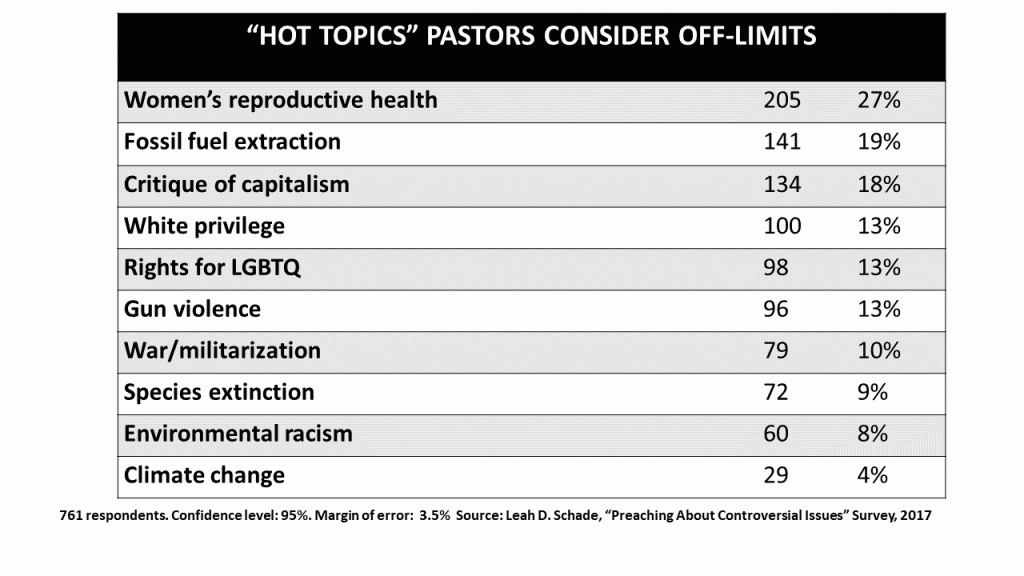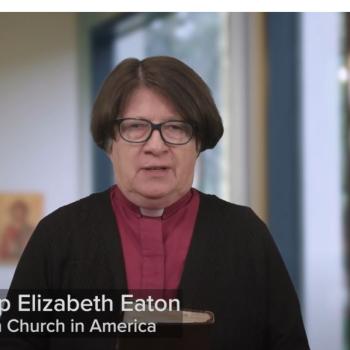What’s the taboo topic you just won’t touch in your preaching? What gives you pause when you consider taking a prophetic stance on a contemporary issue in a sermon? What are the “hot topics” you avoid?

In my book Preaching in the Purple Zone: Ministry in the Red-Blue Divide (Rowman & Littlefield, 2019), I note that whether you are a clergy person or a member of a congregation, the question of addressing social issues in a sermon is fraught with both risk and opportunity. Tackling justice issues in the pulpit can provide the preacher and congregation with a chance to apply scripture to topics that relate to our daily lives, our social institutions, and our community’s well-being. But there are also many reasons preachers hold back on their prophetic voice, such as concern about angering those who disagree with their stance or alienating those who believe that politics do not belong in a worship service.
So what topics are off the table (or off the pulpit) when it comes to sermons?
In the first two months of 2017, I conducted a survey of mainline Protestant clergy in the United States to assess how preachers approached their sermons during this divisive time in our nation’s history. I designed and conducted a 60-question online survey entitled “Preaching about Controversial Issues,” which ran for six weeks, from mid-January to the end of February. I received responses from 1205 participants in 45 states (with an almost equal number of male and female respondents).
In one part of the survey, respondents were given a list of 38 possible topics including things like health care, immigration, and fossil fuel extraction. They were asked to pick the two that they would actively avoid in their sermons. The results give us a snapshot of the “hot button” topics for preachers in mainline Protestant churches.
What topic will you NOT preach about?
Of the 761 preachers who responded to this question, 205 listed women’s reproductive health as an issue they would actively avoid in their sermons. 27% said they would not preach on that topic. It was the #1 issue preachers said they won’t talk about.
 Why the hesitancy to discuss women’s reproductive health issues?
Why the hesitancy to discuss women’s reproductive health issues?
This category covers a number of topics, such as infertility, access to and the use of contraceptives, access to pre-natal care, and female-specific health issues such as endometriosis or menopause, to name a few. But the strongest aversion to this category is likely due to another taboo topic: abortion.
In a recent Facebook discussion on this topic, one of my colleagues, Rev. Justin Johnson, said that there are very few topics he won’t discuss except one. “As a preacher who doesn’t shy away from preaching about social issues, I will say there is one topic I never talk about or touch upon: ABORTION. I think the topic is non-debatable in that most people have made up their minds and are unwilling to budge. There is no argument, point, or idea which will move someone in a different way regarding their attitude about abortion.”
He added: “I certainly have my own ideas and opinions, but I recognize they are just that – my own ideas and opinions. I feel men should stand back from the topic.”
Others in the confidential survey shared their own reasons why they won’t preach about women’s health issues.
Many indicated that their congregation is divided on this issue and that the topic is better suited for an adult forum or other format. Here are some of their individual comments:
“Our denominational standard is more clear-cut than our church’s nuanced and diverse opinions on the topic. I don’t know how to stand in that breech faithfully.”
“I know people in the congregation for whom this is so sensitive that I’m not sure it would be the gospel to preach on it. People who have had abortions, people who are struggling to conceive and couldn’t ever understand why someone would have an abortion.”
“I feel like preaching on this topic would only empower people who want to become militants on the issue.”
Women’s reproductive health as a justice issue
Despite these concerns, some pastors did indicate their willingness to address women’s reproductive health issues either in an educational setting or individually with members of their congregation. For example, Johnson said he is willing to talk about one-on-one with parishioners about these issues.
“I can certainly talk about abortion as a justice issue if we sat down for a conversation. I might begin by asking, ‘Who are clinics primarily for? If the US banned and criminalized abortion and doctors who performed them, which socio-economic group of people would be arrested at a higher rate? Wouldn’t the rich just fly to a country where abortion is legal? So, who are the clinics for and why isn’t the topic being debated as a race/economic issue in addition to a moral one?’”
Preaching about abortion from a justice perspective, however, is off-limits for Johnson. “It is the sole ‘hot issue’ I have never mentioned in a sermon. It is instantly divisive with very little room for discussion or debate in the listeners’ minds.” Nevertheless, he clarified that he has talked about contraception, the harm the church has done to women with the purity movement, the need for Planned Parenthood, the pervasiveness of domestic violence, and rape/rape culture from the pulpit.
Is it time for preachers to rethink this?
Since the survey was conducted in 2017, several states have proposed and/or passed laws criminalizing women for exercising their reproductive rights. Kentucky, Louisiana, Missouri, Mississippi, Ohio, South Carolina, Tennessee, Alabama, and Georgia all have anti-abortion legislation in the works or in effect. Georgia now has a law banning abortions before women even know they’re pregnant (the “heartbeat” law) and criminalizing women who have miscarriages. So it may be that some pastors are rethinking their aversion to addressing women’s reproductive health issues.
Preachers have plenty of biblical stories to draw on. Stories of infertility, menstruation, endometriosis (the woman with “an issue of blood” in the Gospels), and rape are all found within scripture. The questions surrounding women’s health issues are longstanding and ongoing. With pastoral sensitivity and an invitation into dialogue about these issues, preaching about women’s reproductive health can be part of a larger project of addressing a subject that affects the lives of so many.
What about the other 9 topics on the list?
In future posts, I’ll explore the other subjects which preachers said they avoid in their preaching.
In the meantime, if you’re interested in learning more about how you can approach difficult social issues in your preaching and ministry, Preaching in the Purple Zone: Ministry in the Red-Blue Divide is a resource for helping the church understand the challenges facing parish pastors, while encouraging and equipping preachers to address the vital justice issues of our time. You’ll learn about the “sermon-dialogue-sermon” method I’ve developed that grounds preaching in biblical and theological foundations while engaging the congregation in dialogue to discover the values that bind us together.

Leah D. Schade is the Assistant Professor of Preaching and Worship at Lexington Theological Seminary in Kentucky. She is the author of Preaching in the Purple Zone: Ministry in the Red-Blue Divide (Rowman & Littlefield, 2019) and Creation-Crisis Preaching: Ecology, Theology, and the Pulpit (Chalice Press, 2015).
Twitter: @LeahSchade
Facebook: https://www.facebook.com/LeahDSchade/
Read also:
How to Preach When You Are Afraid
Preaching Across Divides: Purple Zone Strategies for Pulpit and Public Square
How to Survive a Red/Blue Thanksgiving: Creating a ‘Purple Zone’













